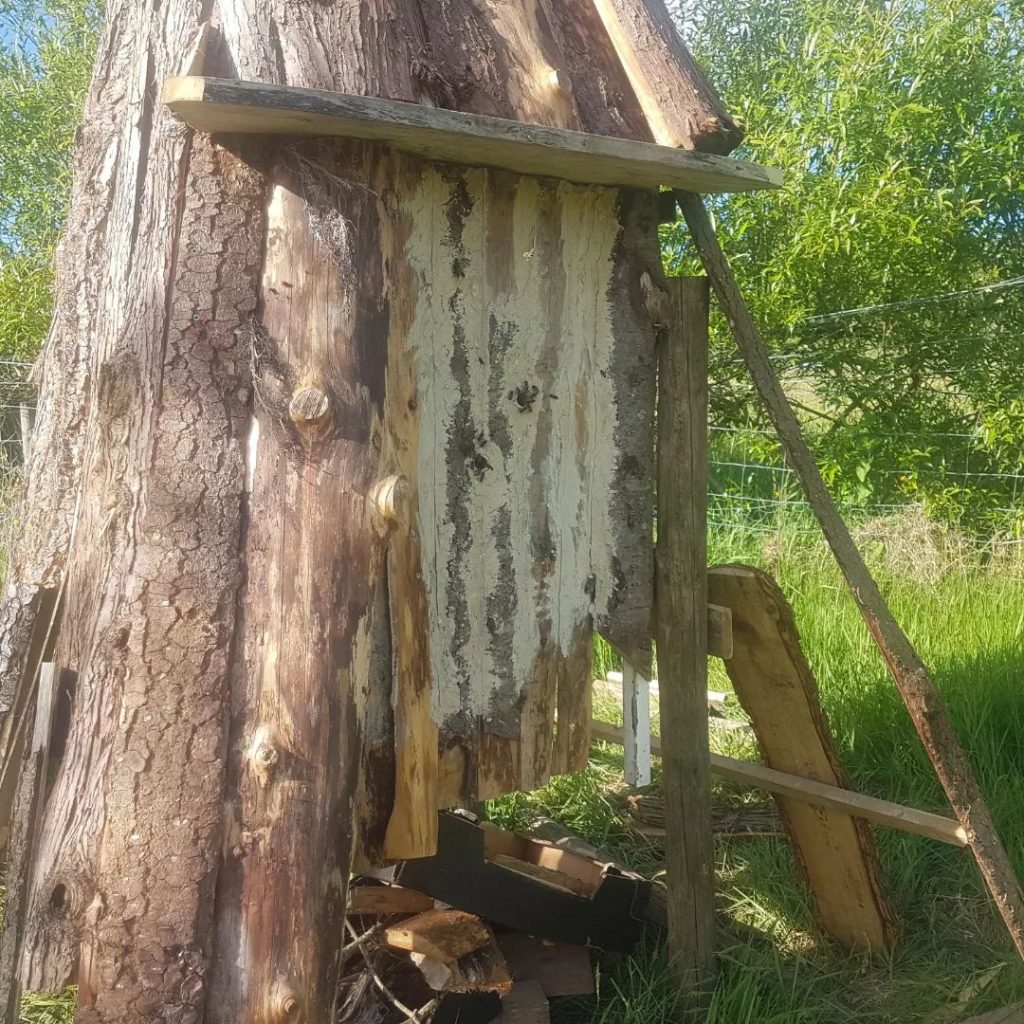“Honey bees that choose their own nesting site and live without human intervention.” [Jonathan Powell, Free-Living Bees]
“Reducing the impact of modern beekeeping practices on the environment.” [Kevin Hancock, Gardener’s Beehive]
.
What are ‘free living bees’?
There is something magical about wild living honey bees. We have known since time immemorial that honey bees are forest dwellers. But the knowledge of this deeply entwined and beautiful connection with trees and other forest spirits has almost been lost. We have come to view the honey bee as an agricultural animal that exists for our use. Fortunately a change of consciousness is emerging. Free-Living Honey Bees – as nature intended
Well, they are found in Devon too:
I found this beautiful nest yesterday near Black Dog in mid Devon. At least 25ft up in an ancient oak Free living bees
And here’s a wonderful piece written by Jonathan Powell, just published:
Free-living Bees
Definition: Honey bees that choose their own nesting site and live without human intervention.
When considering the natural preferences of the honey bee I am often reminded the well known Wendell Berry quote:
“We have never known what we were doing, because we have never known what we were undoing. We cannot know what we are doing until we know what nature would be doing if we were doing nothing.” 1987
Last month, he gave an online talk:
Free Living Bees’ by the Natural Beekeeping Trust – presented by Jonathan Powell & Simon Kellam.
The Natural Beekeeping Trust was formed in 2009 to facilitate an alternative approach to the care of bees, encouraging attention to their real nature, nesting preferences, forage needs and their all-encompassing purpose.
This talk shares exciting new insights into the lifestyle choices of bees in the absence of human engagement. The knowledge of what they are capable of without us will hopefully inspire us all, whether just beekeepers or lovers of honeybees, to truly support them and safeguard their future.
The Natural Beekeeping Trust are also doing great things:
We encourage attention to the real nature of bees, their nesting preferences, their forage needs and their all-encompassing purpose. We hope to inspire people to live in peace with the bees, be good hosts to them, guard them and grow for them, in all ways imaginable. Natural Beekeeping Trust
With very update goings-on here: (20+) Facebook
Here’s Jonathan Powell writing about where bees naturally like to home:
Observations of bees in the wild have shown us that colonies mostly choose to nest several metres above the ground. As our trustee Jonathan Powell writes in his article “Tree Beekeeping: Reviving a Lost Tradition“, Tree Beekeeping is a 1,000 year old practice of keeping bees in slots, cut high above the ground into living pine, lime and oak trees, akin to the natural homes of bees. The tree hive is designed so that the tree is not harmed and will continue to live for many years. Traditionally care of the bees and the tree was passed on from one generation to the next, and the tree was protected by law. The Natural Beekeeping Trust – Tree Beekeeping
Carpenter/cabinet maker Matt Somerville replicates this method:
I designed a warm insulated hive which encouraged minimal intervention from the keeper, immediately reducing both stress and disease in the bee. This led to hollowed log hives, a method used successfully in Poland and in the Cévennes region of France. Thus started a journey and the creation of the Freedom and Golden hive. Bee Kind Hives – sustainable beekeeping
With his work in full view here: The Freedom Log Hive – Bee Kind Hives
These ideas are becoming very much mainstream – with an interview here with Matt Somerville from a couple of years ago in Country Life: Curious Questions: Do bees really need to be kept in artificial hives? – Country Life
In May this year, on World Bee Day, there was an open day at Stoney Orchard in Sidbury: World BEE Day at Stoney Orchard , Stoney Orchard Growing Community, 21 May
And last May, there was wonderful news:

The bees have found their new home! Bee happy here bees.
Thank you so much to so many that have helped create, but especially to Mike who is always there to help and puts up with my crazy create schemes.
Permaculture ways send you on unusual paths sometimes!
Much gratitude to Jenny, @bee.wild.plants and Matt @_beekindhives_ for starting me on this wild honey bee journey. We need more wild homes for these amazing creatures.
Another hive will be started soon for the other swarm waiting in the guelder rose.
(20+) The bees have found their new… – Stoney Orchard Growing Community | Facebook
This is an important local project on many levels: Stoney Orchard Growing Community – East Devon Area of Outstanding Natural Beauty
Wild bees clearly appreciate ancient trees and ‘wild woods’ – which nevertheless need management, but they can also be encouraged in our gardens and public spaces:
Welcome to Eco Beehive, where we put the well-being of honeybees first. Our aim is to help families become self-sufficient with honey, while also reducing the impact of modern beekeeping practices on the environment. We offer a range of products and resources to support our mission, including the Eco Beehive, an innovative honeybee nest box designed with the bees’ needs in mind. Gardeners Beehive – Eco Beehive, Natural Beekeeping
With more from Kevin Hancock about his eco beehive: Gardeners Beehive – YouTube
Meanwhile, there are more and more ways to engage with the ideas and practice of helping wild bees:
Would you like to listen to or chat with arboreal apiculture experts and enthusiasts from around the world? It’s easy join our free live stream events where you will receive a warm welcome and introduction to bees and their natural home. Arboreal Apiculture Salon
Finally, there are several Devon-based bee-friendly businesses, including this one based in Colyton: Tree-Harvest Ltd [formerly Tree-Harvest]
.